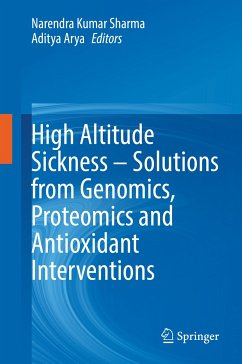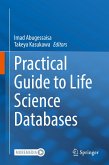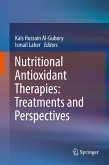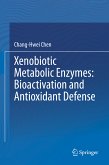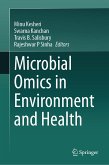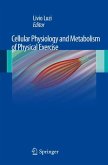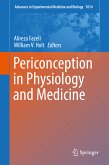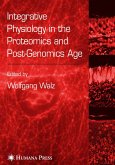High Altitude Sickness – Solutions from Genomics, Proteomics and Antioxidant Interventions (eBook, PDF)
171,19 €
inkl. MwSt.
Sofort per Download lieferbar
High Altitude Sickness – Solutions from Genomics, Proteomics and Antioxidant Interventions (eBook, PDF)
- Format: PDF
- Merkliste
- Auf die Merkliste
- Bewerten Bewerten
- Teilen
- Produkt teilen
- Produkterinnerung
- Produkterinnerung

Bitte loggen Sie sich zunächst in Ihr Kundenkonto ein oder registrieren Sie sich bei
bücher.de, um das eBook-Abo tolino select nutzen zu können.
Hier können Sie sich einloggen
Hier können Sie sich einloggen
Sie sind bereits eingeloggt. Klicken Sie auf 2. tolino select Abo, um fortzufahren.

Bitte loggen Sie sich zunächst in Ihr Kundenkonto ein oder registrieren Sie sich bei bücher.de, um das eBook-Abo tolino select nutzen zu können.
This book reviews the recent advances in the development of proteomics-based biomarkers for the non-invasive diagnosis of altitude sickness and explores the potential of antioxidant therapy for this sickness.
The first chapters introduce the associated pathophysiology and provide mechanistic insights into the enhanced generation of reactive oxygen and nitrogen species (RONS), which leads to an increase in oxidative damage to lipids, proteins, and DNA.
The book then highlights the current problems relating to the diagnosis and treatment of altitude sickness and summarizes novel approaches…mehr
- Geräte: PC
- ohne Kopierschutz
- eBook Hilfe
- Größe: 4.7MB
- Upload möglich
Andere Kunden interessierten sich auch für
![Practical Guide to Life Science Databases (eBook, PDF) Practical Guide to Life Science Databases (eBook, PDF)]() Practical Guide to Life Science Databases (eBook, PDF)501,83 €
Practical Guide to Life Science Databases (eBook, PDF)501,83 €![Nutritional Antioxidant Therapies: Treatments and Perspectives (eBook, PDF) Nutritional Antioxidant Therapies: Treatments and Perspectives (eBook, PDF)]() Nutritional Antioxidant Therapies: Treatments and Perspectives (eBook, PDF)213,99 €
Nutritional Antioxidant Therapies: Treatments and Perspectives (eBook, PDF)213,99 €![Xenobiotic Metabolic Enzymes: Bioactivation and Antioxidant Defense (eBook, PDF) Xenobiotic Metabolic Enzymes: Bioactivation and Antioxidant Defense (eBook, PDF)]() Chang-Hwei ChenXenobiotic Metabolic Enzymes: Bioactivation and Antioxidant Defense (eBook, PDF)149,79 €
Chang-Hwei ChenXenobiotic Metabolic Enzymes: Bioactivation and Antioxidant Defense (eBook, PDF)149,79 €![Microbial Omics in Environment and Health (eBook, PDF) Microbial Omics in Environment and Health (eBook, PDF)]() Microbial Omics in Environment and Health (eBook, PDF)192,59 €
Microbial Omics in Environment and Health (eBook, PDF)192,59 €![Cellular Physiology and Metabolism of Physical Exercise (eBook, PDF) Cellular Physiology and Metabolism of Physical Exercise (eBook, PDF)]() Cellular Physiology and Metabolism of Physical Exercise (eBook, PDF)149,79 €
Cellular Physiology and Metabolism of Physical Exercise (eBook, PDF)149,79 €![Periconception in Physiology and Medicine (eBook, PDF) Periconception in Physiology and Medicine (eBook, PDF)]() Periconception in Physiology and Medicine (eBook, PDF)149,79 €
Periconception in Physiology and Medicine (eBook, PDF)149,79 €![Integrative Physiology in the Proteomics and Post-Genomics Age (eBook, PDF) Integrative Physiology in the Proteomics and Post-Genomics Age (eBook, PDF)]() Integrative Physiology in the Proteomics and Post-Genomics Age (eBook, PDF)96,29 €
Integrative Physiology in the Proteomics and Post-Genomics Age (eBook, PDF)96,29 €-
-
-
This book reviews the recent advances in the development of proteomics-based biomarkers for the non-invasive diagnosis of altitude sickness and explores the potential of antioxidant therapy for this sickness.
The first chapters introduce the associated pathophysiology and provide mechanistic insights into the enhanced generation of reactive oxygen and nitrogen species (RONS), which leads to an increase in oxidative damage to lipids, proteins, and DNA.
The book then highlights the current problems relating to the diagnosis and treatment of altitude sickness and summarizes novel approaches for identifying potential biomarkers and therapeutics. Lastly, it explores the therapeutic efficacy of antioxidant agents.
The first chapters introduce the associated pathophysiology and provide mechanistic insights into the enhanced generation of reactive oxygen and nitrogen species (RONS), which leads to an increase in oxidative damage to lipids, proteins, and DNA.
The book then highlights the current problems relating to the diagnosis and treatment of altitude sickness and summarizes novel approaches for identifying potential biomarkers and therapeutics. Lastly, it explores the therapeutic efficacy of antioxidant agents.
Produktdetails
- Produktdetails
- Verlag: Springer Nature Singapore
- Erscheinungstermin: 30. Juni 2022
- Englisch
- ISBN-13: 9789811910081
- Artikelnr.: 64256875
- Verlag: Springer Nature Singapore
- Erscheinungstermin: 30. Juni 2022
- Englisch
- ISBN-13: 9789811910081
- Artikelnr.: 64256875
Dr. Narendra Kumar Sharma is working as Assistant Professor at the Department of Biosciences and Biotechnology of the Banasthali Vidyapith, India. He has earlier served as Assistant Professor in the Science Department at AKM, Kota University, India, Post-doctoral Fellow at Guangzhou Institutes of Biomedicine and Health (GIBH), Chinese Academy of Sciences (CAS), China and Post-doctoral Fellow at Federal University of Sao Paulo (UNIFESP), Brazil. His research interest is in Genomics and Proteomics with specialization in hypoxia physiology, oxidative stress, post-translational modification, protein biochemistry, signaling pathway, protein-protein interaction, infectious disease, regenerative medicine, and genome editing. He has been conferred with the prestigious award Dr T S Vasundhara memorial best paper award, DRDO, India. He has served as a referee for a number of international journals. He has also published more than 20 research articles in peer-reviewed international journals and authored or co-authored books and book chapters. He has presented his research work at various international conferences held in India, Brazil, China, USA, and Germany. He is a member of many international scientific societies and organizations importantly, Indian Academy of Neuroscience (IAN), India and International Organization of Scientific Research (IOSR), India
Dr. Aditya Arya is working as a scientist at the National Institute of Malaria Research, New Delhi, a flagship lab of the Indian Council of Malaria Research (ICMR). Previously he worked as a staff scientist at Pathfinder Research and Training Foundation, Gautam Budh Nagar, India. His research interest is in nanomedicine and redox biology. He has been trained at some of the most prestigious institutions such as Wellcome Trust Sanger Institute, IBRO, EMBL and holds active membership in several research societies. He has published more than 20 research papers in peer-reviewed journals about redoxbiology, proteomics, and high altitude physiology. Besides this, he is also an academician and authored several book and book chapters like Concise Biochemistry, Understanding Enzymes, to name a few.
Dr. Aditya Arya is working as a scientist at the National Institute of Malaria Research, New Delhi, a flagship lab of the Indian Council of Malaria Research (ICMR). Previously he worked as a staff scientist at Pathfinder Research and Training Foundation, Gautam Budh Nagar, India. His research interest is in nanomedicine and redox biology. He has been trained at some of the most prestigious institutions such as Wellcome Trust Sanger Institute, IBRO, EMBL and holds active membership in several research societies. He has published more than 20 research papers in peer-reviewed journals about redoxbiology, proteomics, and high altitude physiology. Besides this, he is also an academician and authored several book and book chapters like Concise Biochemistry, Understanding Enzymes, to name a few.
1 Introduction to High Altitude and Hypoxia.- 2 High altitude sickness: environmental stressor and altered physiological response.- 3 High-Altitude Related Diseases: Milder Effects, HACE, HAPE, and Effect on Various Organ Systems.- 4 High altitude-induced Oxidative stress, Rheumatoid Arthritis and proteomic alteration.- 5 Oxidative Stress, ROS generation and Associated Molecular Alterations in High Altitude Hypoxia.- 6 Oxidative Stress, ROS generation and Associated Molecular Alterations in High Altitude Hypoxia.- 7 Current problems in diagnosis and treatment of high altitude sickness.- 8 Proteomics as a potential tool for biomarker discovery.- 9 Serum and Plasma Proteomics for High-Altitude Related Biomarker Discovery.- 10 Saliva Proteomics As Non-Invasive Application For Biomarker Studies.- 11 Role of genomics, proteomics and antioxidant interventions in preventing High Altitude Sickness.- 12 High Altitude Sickness AndAntioxidant Interventions.- 13 Antioxidant therapy for high altitude sickness and Nano-medicine.
1 Introduction to High Altitude and Hypoxia.- 2 High altitude sickness: environmental stressor and altered physiological response.- 3 High-Altitude Related Diseases: Milder Effects, HACE, HAPE, and Effect on Various Organ Systems.- 4 High altitude-induced Oxidative stress, Rheumatoid Arthritis and proteomic alteration.- 5 Oxidative Stress, ROS generation and Associated Molecular Alterations in High Altitude Hypoxia.- 6 Oxidative Stress, ROS generation and Associated Molecular Alterations in High Altitude Hypoxia.- 7 Current problems in diagnosis and treatment of high altitude sickness.- 8 Proteomics as a potential tool for biomarker discovery.- 9 Serum and Plasma Proteomics for High-Altitude Related Biomarker Discovery.- 10 Saliva Proteomics As Non-Invasive Application For Biomarker Studies.- 11 Role of genomics, proteomics and antioxidant interventions in preventing High Altitude Sickness.- 12 High Altitude Sickness AndAntioxidant Interventions.- 13 Antioxidant therapy for high altitude sickness and Nano-medicine.
1 Introduction to High Altitude and Hypoxia.- 2 High altitude sickness: environmental stressor and altered physiological response.- 3 High-Altitude Related Diseases: Milder Effects, HACE, HAPE, and Effect on Various Organ Systems.- 4 High altitude-induced Oxidative stress, Rheumatoid Arthritis and proteomic alteration.- 5 Oxidative Stress, ROS generation and Associated Molecular Alterations in High Altitude Hypoxia.- 6 Oxidative Stress, ROS generation and Associated Molecular Alterations in High Altitude Hypoxia.- 7 Current problems in diagnosis and treatment of high altitude sickness.- 8 Proteomics as a potential tool for biomarker discovery.- 9 Serum and Plasma Proteomics for High-Altitude Related Biomarker Discovery.- 10 Saliva Proteomics As Non-Invasive Application For Biomarker Studies.- 11 Role of genomics, proteomics and antioxidant interventions in preventing High Altitude Sickness.- 12 High Altitude Sickness AndAntioxidant Interventions.- 13 Antioxidant therapy for high altitude sickness and Nano-medicine.
1 Introduction to High Altitude and Hypoxia.- 2 High altitude sickness: environmental stressor and altered physiological response.- 3 High-Altitude Related Diseases: Milder Effects, HACE, HAPE, and Effect on Various Organ Systems.- 4 High altitude-induced Oxidative stress, Rheumatoid Arthritis and proteomic alteration.- 5 Oxidative Stress, ROS generation and Associated Molecular Alterations in High Altitude Hypoxia.- 6 Oxidative Stress, ROS generation and Associated Molecular Alterations in High Altitude Hypoxia.- 7 Current problems in diagnosis and treatment of high altitude sickness.- 8 Proteomics as a potential tool for biomarker discovery.- 9 Serum and Plasma Proteomics for High-Altitude Related Biomarker Discovery.- 10 Saliva Proteomics As Non-Invasive Application For Biomarker Studies.- 11 Role of genomics, proteomics and antioxidant interventions in preventing High Altitude Sickness.- 12 High Altitude Sickness AndAntioxidant Interventions.- 13 Antioxidant therapy for high altitude sickness and Nano-medicine.
